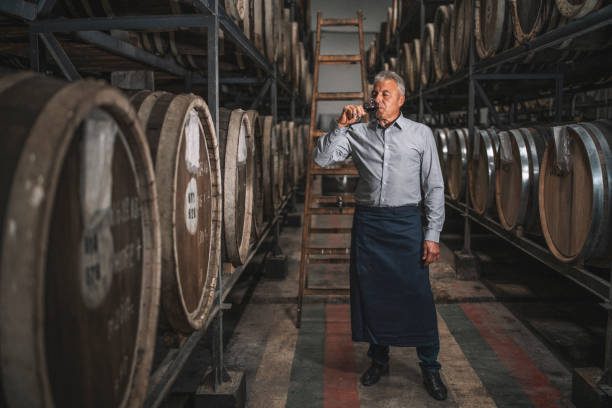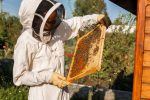
| Vintner Key Stats | |
|---|---|
| Education | 4+ Years |
| Job Outlook | 7% |
A Vintner is a professional who is experienced in winemaking as well as the trading and selling involved with this popular drink; these professionals are often referred to as wine merchants.
Vintners are closely related to winemakers as they are hands on in the production of wine, but also have the duties of a merchant and are involved in the wholesale trade of wine.
These individuals are typically hired by wineries or wine companies with some of these individuals owning and running their own winery.
Individuals who want to become a Vintner will need a combination of experience in the field, a strong sense of smell and taste and some personal characteristics in order to succeed in this profession.
Some helpful personal characteristics can include: business acumen to assist in the wholesale trade of wine, knowledge of the harvesting seasons to pick grapes and some technical background to mass produce wines.
Table of Contents
Education Requirements to Become a Vintner
There are no specific educational requirements an individual needs in order to become a Vintner.
However, individuals are encouraged to gain mastery in the technical aspects of winemaking, strengthen their acumen to distinguish wines and gain experience in merchant training to become successful in this field.
Individuals pursuing a bachelor’s degree to help them become a Vintner have the option to study enology, viticulture or a closely related field for better job prospects in this industry.
A degree in one of these programs will prepare individuals behind the science of wine making, the variations of grapes and the different tastes they create.
Because mass production is becoming commonplace with winemaking, the technical aspects behind creating this drink are highly important.
Individuals may also pursue an additional two years of school at the master’s level in order to pursue a career as a Vintner; individuals can study viticulture at the master’s level.
Vintner Job Description
Vintners are experienced in the production and the wholesale trade of wine.
These individuals may work for a vineyard or winery and can be involved starting with the harvesting of grapes, the production and fermentation of wines and the wholesale trade of this globally popular drink.
Exact duties will heavily depend on the size of a winery or vineyard.
With smaller wineries, these professionals will have more duties.
Harvesting grapes begins with a Vintner’s vast knowledge of the harvesting season; deciding the point at which grape bunches are ripe for the production of wine.
The following is a list of the steps winemakers and vintners take in order to create wine.
- Harvesting ripe grapes
- Crushing grapes to produce liquid
- Fermenting grapes to produce an alcoholic element
- Aging grapes to help with the drink’s alcoholic elements
- Blending and bottling a variety of wines
Vintners are widely known as professionals behind the science and art of winemaking.
Their skills include knowing the many variations of wines from dark reds to sparkling whites as well as thorough knowledge of the specific grapes and the amount of aging needed to create a variety of wines.
Vintner Salary and Career Path
There are no exact salary figures for Vintners because the profession is comparatively small when compared to other professions.
However, this profession falls under the larger occupational group of food scientists and technicians.
In 2012, the median salary for food scientists and technologists was approximately $59,630 per year.
Exact wages will depend on the size of the vineyard or winery one is employed by, geographical location and whether an individual works full time throughout the year.
The job outlook for Vintners is also categorized alongside food scientists and technologists.
The job outlook for food scientists and technologists is expected to grow at an average rate when compared to other professions.
Job opportunities for all food scientists and technologists, including Vintners, are projected to grow by 11 percent through the year 2022.
Factors contributing to this growth include an increase in demand due to a growing population and the popularity of wine throughout the globe.
Individuals with a technical background, that is, those who have the scientific background needed in the mass production of wine, have better job opportunities.
With their knowledge in the production of wine and experience as wine merchants, Vintners have a strong background in the business of wine.
This profession can be a great fit with individuals with business acumen, a strong passion for the wine industry and a great sense of taste.
Vintners use a variety of skills that help with the worldwide consumption of this popular alcoholic drink
![]() The below information is based on the 2023 BLS national averages.
The below information is based on the 2023 BLS national averages.
National Average Salary
$62,640Average Salary by State
| State | Avg. Annual Salary |
|---|---|
| Alabama | $64,310 |
| Alaska | $65,710 |
| Arizona | $70,130 |
| Arkansas | $55,050 |
| California | $67,150 |
| Colorado | $70,130 |
| Connecticut | $66,950 |
| Delaware | $58,810 |
| District of Columbia | $75,520 |
| Florida | $61,880 |
| Georgia | $55,460 |
| Hawaii | $99,520 |
| Idaho | $49,010 |
| Illinois | $66,610 |
| Indiana | $56,180 |
| Iowa | $46,180 |
| Kansas | $56,990 |
| Kentucky | $47,280 |
| Louisiana | $48,930 |
| Maine | $58,540 |
| Maryland | $66,560 |
| Massachusetts | $77,120 |
| Michigan | $56,730 |
| Minnesota | $60,550 |
| Mississippi | $51,830 |
| Missouri | $56,430 |
| Montana | $53,040 |
| Nebraska | $61,730 |
| Nevada | $62,020 |
| New Hampshire | $58,690 |
| New Jersey | $71,100 |
| New Mexico | $66,610 |
| New York | $68,410 |
| North Carolina | $61,300 |
| North Dakota | $70,920 |
| Ohio | $53,800 |
| Oklahoma | $39,130 |
| Oregon | $58,160 |
| Pennsylvania | $64,940 |
| Rhode Island | $81,170 |
| South Carolina | $55,240 |
| South Dakota | $47,840 |
| Tennessee | $59,540 |
| Texas | $52,950 |
| Utah | $56,320 |
| Vermont | $64,870 |
| Virginia | $54,950 |
| Washington | $67,360 |
| West Virginia | $58,260 |
| Wisconsin | $60,570 |
| Wyoming | $61,080 |
| Guam | $44,020 |
| Puerto Rico | $36,570 |
| Virgin Islands | $43,260 |
The top earning state in the field is Hawaii, where the average salary is $99,520.
These are the top 5 highest-paying states in the field:
* Employment conditions in your area may vary.
Frequently Asked Questions
What is a vintner?
Vintners, sometimes also called winemakers, are persons who make wine.
They work in collaboration with viticulturists, who cultivate grapes.
Vintners are usually employed by wineries or wine companies where they are responsible for cooperating with viticulturists, monitoring the quality of grapes and determining the right time to harvest, supervising the winemaking process, testing the quality, and supervising the maturing and the bottling processes.
Nowadays laboratory tests are gradually replacing traditional methods and vintners also need scientific knowledge.
They also need a keen sense of taste and smell.
Vintners must be familiar with the production rules and regulations set by the region where their product is manufactured and sold.
How much does a vintner make?
A vintner’s annual salary depends on his or her employer and level of experience.
According to a study made by Payscale.com, the median annual salary for winemakers is $59,709.
The lowest 10% earned around $37,000, while the highest 10% earned around $102,000.
How much does it cost to become a vintner?
Although there are no strict educational requirements for winemakers, completing a bachelor’s degree in viticulture, enology or a related field can provide you with the training necessary to work in a winery.
The average annual cost for out-of-state bachelor’s degree programs in enology and viticulture range from $36,000 to $68,000, depending on the college you choose.
Associate programs are also available and cost around $22,000 a year for out-of-state students.
Vintners must also be familiar with the regulations set by the U.S. Alcohol and Tobacco Tax and Trade Bureau.
What is the demand for vintners?
According to the Bureau of Labor Statistics, the demand for agricultural and food scientists is expected to grow 7 percent from 2018 to 2028.
Food scientists and technologists will continue to be needed in the future to improve food processing techniques and to ensure that the products are safe.
A report by the Bureau of Labour Statistics shows that employment in wineries was up 153 percent from 2001 to 2017.
However, the number of employment opportunities for vintners and winemakers varies by region.
For instance, the numbers published by the Bureau of Labour Statistics show that California wineries employed almost $37,000 people in 2017, while Arizona wineries employed 281 people.
How long does it take to become a vintner?
You can learn the winemaking trade through on-the-job learning or through a two or four-year degree program.
Although it is not a requirement, getting a two-year associate’s degree or a four-year bachelor’s degree in enology, viticulture or a related field can help you learn the skills needed to start a career in this field.
Although a license is not required for vintners who are employed by wineries, if you want to start your own business, you will need to get a state license to produce alcoholic beverages.
Getting your certification can help you demonstrate your winemaking skills and knowledge to prospective clients and employers.
The Certified Specialist in Wine certification offered by the Society of Wine Educators can be obtained if you pass an exam.
Research-based master’s and Ph.D. degrees are also available in enology and viticulture.
If you want a career in the winemaking industry, you could start by getting employment as a cellar assistant or a similar entry-level position.













